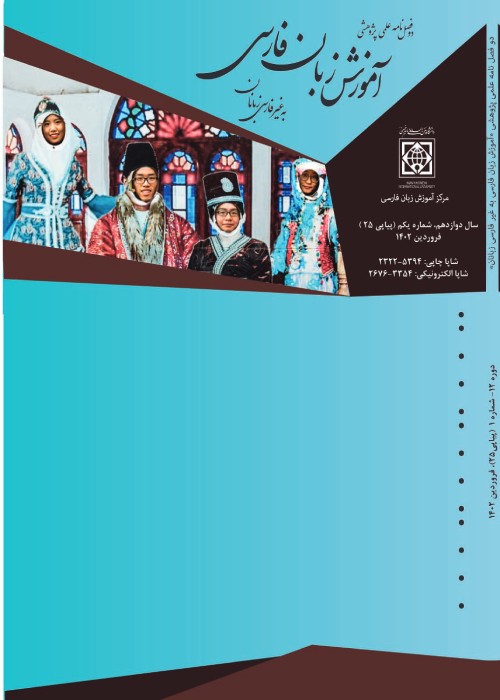Academic Achievement and Self-Regulation Strategies For Learning Persian as a Second Language
The purpose of this study was to investigate the effect of using self-regulation learning strategies on Arab Persian language learners' academic achievement. This study was descriptive and 45 male and female students from the Persian language center of Imam Khomeini International University were selected as participants through random sampling. The Pintrich and De Groot’s Self-Regulation Learning Strategies Inventory (1990) was used as a tool for data collection. The learners’ grade point averages on a four-skill coordinated test of Persian language in the academic year 2017-18 were considered as indicators of academic achievement. After filling out the questionnaire, the data were analyzed by means of Pearson correlation coefficient test, t-test of two independent samples, and a stepwise multiple regression. The results of this study showed that, in learning Persian language as a second language, there is a significant positive correlation between self-regulation, self-efficacy and internal evaluation and academic achievement. Between test anxiety and academic success, a significant negative correlation was observed. Also, in this study, there was no significant difference between male and female learners in applying self-regulation strategies. Cognitive strategies positively, and test anxiety negatively predicted the academic achievement of Persian learners. At the end, suggestions were offered for Persian language instructors to have their students attend to the use of self-regulation learning strategies. Extended Abstract</strong> In the area of academic achievement, one of the most influential theories of learning is the theory of learning strategies. According to (Omalley & Chamot, 1990), learning strategies are skills that are first acquired as declarative knowledge and eventually become highly procedural knowledge through practice. Different researchers have classified strategic learning in different classifications (Griffiths, 2008). Zimmerman (2015) provided a broader classification of self-regulated strategies according to an active process which involves thoughts, emotions, and spontaneous behaviors and guides one towards the goals he or she has set for himself. Therefore, self-regulated learners are introduced as individuals who contribute to their learning.</strong> In the past few years, non-Persian speakers of different L1 backgrounds have been learning Farsi, and many centers within Iran have been entrusted with teaching Persian as a second language. Therefore, the role of influencing factors on improving Persian learning process and efficient learning is of great importance. Considering the background of the studies and the importance of self-regulation skills as an effective factor in appropriate and effective learning on the one hand and the importance of academic achievement on the other hand, research has been conducted in English and other languages. The impact of applying self-regulated learning strategies on the success rate of non-Iranian students, no reliable research has been conducted to date. Therefore, it seems necessary to examine the impact of such learning strategies on the success rate of non-Iranian students who are learning Farsi as a second language. Therefore, the present study sought to discover the relationship between the use of self-regulated learning strategies and the academic achievement of non-Iranian Persian-speaking students by using the results obtained in Persian as a second language to improve their learning and academic achievement. With this aim in mind the following hypotheses were considered: 1. There is a significant relationship between the use of self-regulated learning strategies and academic achievement of Arab Persian language learners. 2. There is a significant relationship between the use of motivational beliefs (self-efficacy, intrinsic evaluation, and anxiety) and academic achievement of non-Iranian Persian learners. 3. There is a significant relationship between gender and the use of self-regulated learning strategies. 4. The contribution of each of the self-regulation strategies and motivational beliefs to the prediction of Persian language learners’ academic achievement is different. The purpose of this study was to investigate the effect of using self-regulation learning strategies on Persian language learners' academic achievement. This study was descriptive and 45 male and female Persian language learners studying at Imam Khomeini International University were selected as participants through random sampling. The Pintrich and De Groot’s Self-Regulation Learning Strategies Inventory (1990) was used as a tool for data collection. The learners’ grade point averages on a four-skill coordinated test of Persian language in the academic year 2017-18 were considered as indicators of academic achievement. After answering the Farsi version of the questionnaire, the data were analyzed by means of Pearson correlation coefficient test, t-test of two independent samples, and stepwise multiple regression. The results of this study showed that in learning Persian as a second language, there is a significant positive correlation between self-regulation, self-efficacy and internal evaluation and academic success. Between test anxiety and academic success, a significant negative correlation was observed. Also, in this study, there was no significant difference between male and female learners in applying self-regulation strategies. According to the results, in teaching Persian as a second language, teachers should not only pay attention to what is to be taught, but also how and how to learn it. Planners and authors of Persian language teaching books to non-speakers can adjust their educational content according to the principles of self-regulation learning strategies so that teaching through these strategies makes learning more efficient and lasting. Teachers can also get acquainted with this type of learning by holding science courses. Studies show that when using self-regulated learning, 80% of classroom activities are done by the learners and only 20% by the teacher. Therefore, teachers should manage the classroom so that the learners can self-organize and manage most of the activities and hold themselves responsible for their own learning. As a suggestion for future research, it may be worthwhile to study Farsi acquisition by non-Arabic-speaking nationalities in the context of self-regulated learning and compare the results with the research results of this study. On the other hand, the study of the effect of teaching self-regulated learning strategies on the development of Persian language as a second language can also be the subject of future research.
- حق عضویت دریافتی صرف حمایت از نشریات عضو و نگهداری، تکمیل و توسعه مگیران میشود.
- پرداخت حق اشتراک و دانلود مقالات اجازه بازنشر آن در سایر رسانههای چاپی و دیجیتال را به کاربر نمیدهد.



